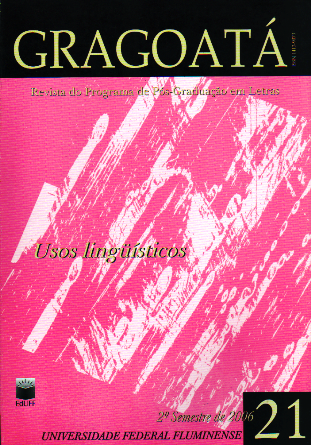Change in Portuguese verbal system: the variants of conditional and the issue of grammaticalization
Keywords:
linguistic change, grammaticalization, auxiliary verbsAbstract
Recent studies have focused the grammaticalization of the verb of movement ir (to go) into an auxiliary verb. This paper shows that in Brazilian Portuguese this auxiliary occurs not only in the expression of the future (time) but also in variation with the conditional; it also shows that the use of the verbal periphrasis with ir has increased diachronically. Until the first half of the XX th century, this auxiliary co-occured with another one, haver de, in this context (irrealis). This paper presents, in addition, the several sematic values for each one of the referred auxiliaries, which may signalize the different semantic levels of the same linguistic form in a grammaticalization process. This study is based on a sample organized for a real-time observation of linguistic change considering a long run of time (a sample of theater plays).Downloads
Downloads
Published
How to Cite
Issue
Section
License
Authors who publish in Gragoatá agree to the following terms:
The authors retain the rights and give the journal the right to the first publication, simultaneously subject to a Creative Commons license CC-BY-NC 4.0, which allows sharing by third parties with due mention to the author and the first publication by Gragoatá.
Authors may enter into additional and separate contractual arrangements for the non-exclusive distribution of the published version of the work (for example, posting it in an institutional repository or publishing it in a book), with recognition of its initial publication in Gragoatá.

Gragoatá is licensed under a Creative Commons - Attribution-NonCommercial 4.0 International.











